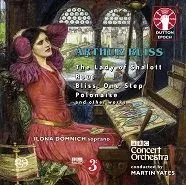
Bliss The Lady of Shallott; Contrasts; Rout; March of Homage etc Ilona Domnich (soprano); BBC Concert Orchestra/Martin Yates Dutton Epoch CDLX 7387 (CD/SACD) 77:38 mins
The biggest work here is The Lady of Shalott, the last and least well-known of Bliss’s ballet scores, in its first complete recording (a version conducted by the composer, taken from a 1968 broadcast, is slightly cut). It consists of a sequence of discrete short movements, all expertly written, taking in the mysterious, the pompous, the athletic and the romantic. The colourful scoring, together with some characteristic melodic and harmonic twists, go right back to the Colour Symphony of the 1920s. Whether it stands up as a whole without the visual element of the dance is another matter, although it’s hard to imagine a more persuasive performance, and the recording is warm and three dimensional.
Paradoxically, the continuous seven-minute span of Rout makes a more rounded impression, with the soprano singing nonsense syllables (not always clear from Ilona Domnich) and its echoes of Stravinsky and the fairground. Of the other short pieces, Polonaise and Bliss are orchestrations of early piano pieces which would work well as accompaniments to a cabaret dance set; and Answering You and Heritage of Britain are signature tunes to long-forgotten BBC Radio programmes.
Musically more significant are the Two Contrasts, arranged from the middle movements of the Second String Quartet, one of Bliss’s more astringent scores. The scampering lines of the scherzo present a few problems to the massed orchestral violins, but they keep the energy flowing. And the March of Homage, written following the death of Churchill, is a solemn remembrance, dark-hued and deeply felt.
Martin Cotton